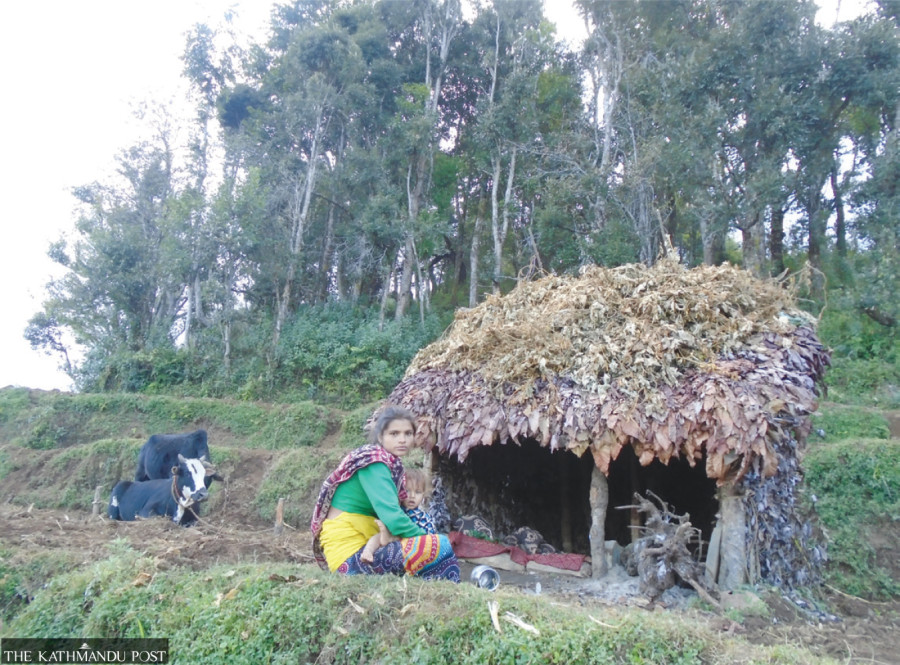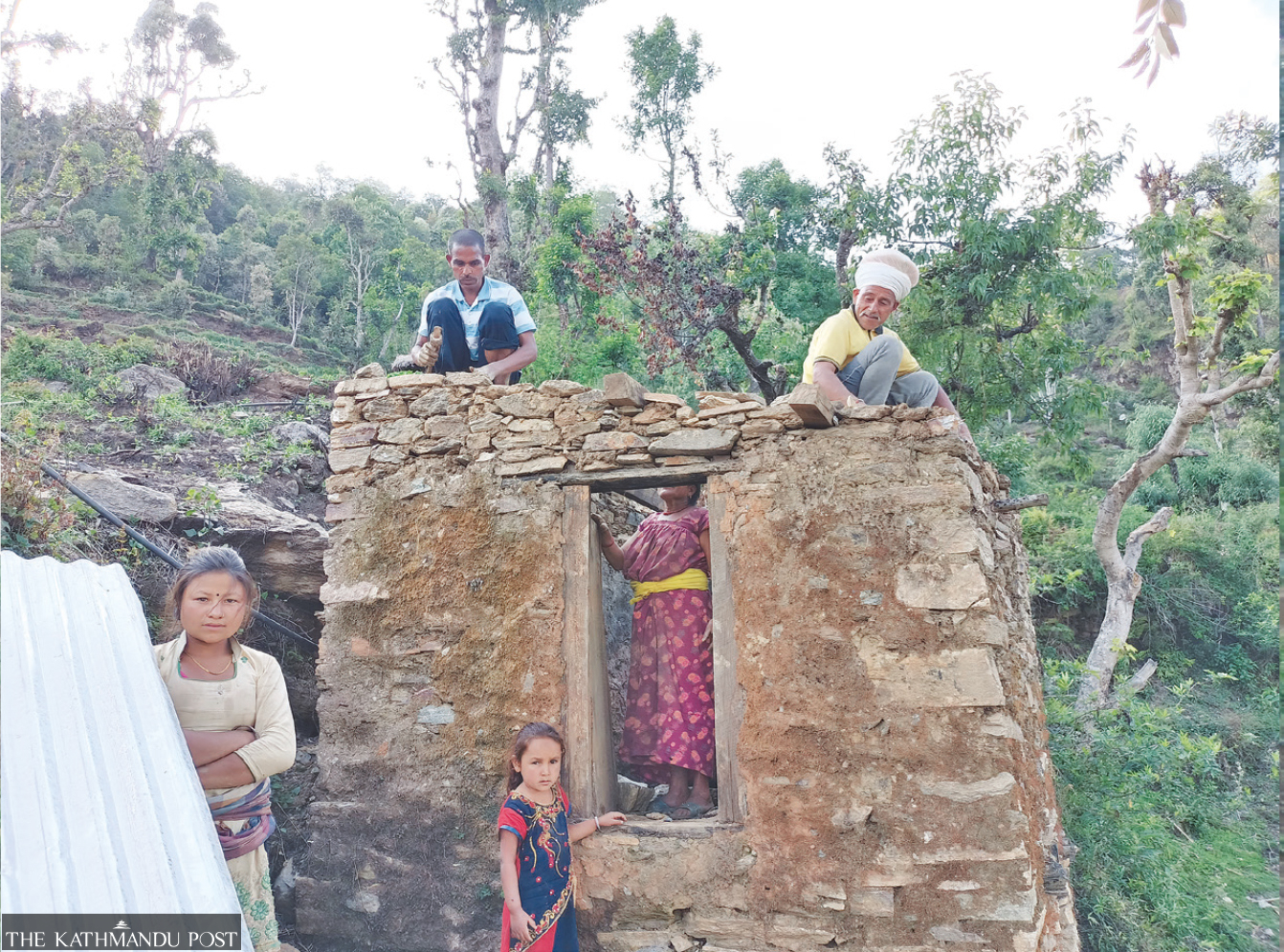Sudurpaschim Province
Chhau sheds reappear. Deep-rooted tradition, failed campaign blamed
Four years ago, a one-off campaign was launched by the government to dismantle menstruation sheds, but there was no follow-up.
Menuka Dhungana
In ward 5 of Dhakari Rural Municipality in Achham district, a 23-year-old woman lives in a chhau shed outside her house for three days every month during her menstrual period.
“Four years ago, with the help of security personnel and all three levels of government, a campaign was launched to demolish chhaugoth [menstruation sheds] and put an end to this deep-rooted practice,” said Thapa.
“After the authorities demolished the sheds, I started staying in a room at my house during my periods, but after a couple of months, I was compelled to stay in a tarpaulin tent outside the house every month. Later, everyone in our village erected chhau sheds again, and currently all the girls here live in sheds during three days of menstruation,” Thapa added.
Despite various campaigns organised by the government and international and local development organisations, the chhaupadi tradition—an outdated social practice in which menstruating girls, women, and postpartum mothers are deemed impure and banished into seclusion for three days—is still prevalent in various districts of the Sudurpaschim and Karnali provinces.
The civil and criminal codes enforced in 2017 have criminalised chhaupadi. The practice is not only discriminatory against women, but also life-threatening. Many reports of girls and women dying in chhau sheds from cold, suffocation, snakebites, and wildlife attacks have surfaced.
In Achham, the sheds that were demolished four years ago have started going up again, and women have resumed living in them during menstruation due to lack of attention from local units and government agencies.
Four years ago, Parbati Budha Rawat, a 20-year-old woman from Siddheshwari in ward 3 of Sanphebagar Municipality of the district, died in a chhau shed due to asphyxiation caused by a woodfire she had lit to keep warm before going to bed.
According to the police, after Parbati’s death, her brother-in-law Chhatra Rawat was arrested by the police after finding out he had forced her to live in the shed during her menstruation. But the police failed to build a strong case against him as nobody from the family or outside registered a complaint.
Based on the police report, Chhatra was presented at the Achham District Court and was sentenced to serve just 45 days in prison for forcing the victim to live in a shed, said police.
Clause 168 (3) of the Civil and Criminal Code provisions three-month jail and a fine of Rs3,000 for anyone who forces a woman to live in a chhau shed during menstruation. The punishment is more severe for those holding public positions.
After the formation of local governments under the federal structure in 2017, the trend of destroying chhau sheds gained momentum with sporadic campaigns aimed at ridding the villages of menstrual taboos.
On January 22, 2020, the federal Ministry of Home Affairs directed the administrations in 19 districts of Sudurpaschim and Karnali provinces to dismantle chhau sheds.

According to the District Administration Office of Achham, under the instruction of the federal Ministry of Home Affairs, more than 10,000 chhau sheds were torn down in 91 wards of ten local units of the district in around a month. Local people's representatives, police, and local residents came forward to support the campaign, but it was later stopped after a couple of months.
Neither the police administration nor the local units gave continuity to the campaign.
Bindu Rawal, deputy chair of Bannigadi Jayagad Rural Municipality, said that currently her office has no plan to dismantle chhau sheds, or to monitor them, or to conduct any awareness programme.
“How can we stop such a deep-rooted tradition without coordinated efforts and federal funding? Due to lack of budget the rural municipality cannot launch any effective programme to end the practice.” said Rawal.
Meanwhile, Netrakala Devi Shahi, deputy chair of the Dhakari Rural Municipality of the district, said nobody in her local unit has rebuilt chhau sheds after they were dismantled a few years ago. But some people still send their women to animal sheds during menstruation.
“Women are being forced to live in barns or under tarpaulin tents after the chhau sheds were demolished. If we take any action against it, there might be a major dispute in the rural municipality as we will be challenging their old beliefs,” said Shahi.
According to the officials of other local units in the district, currently, there are no awareness campaigns or any other efforts to tackle the chhaupadi tradition.
Srijana Saud, a 24-year-old woman from ward 3 of Mangalsen Municipality, said until four years ago, due to the fear of the law and legal action, women in the district used to stay at home during their periods, and nobody would force them to live outside.
“But women are returning to sheds, barns, and tents again because the campaign was discontinued. If it had been given continuity, things would have been much better by now,” said Saud. “The provincial and federal governments appear serious about the Chhaupadi issue only when there is a serious incident. Women always suffer in this patriarchal society, especially in the rural areas where getting help is hard,” Saud added.
“The monsoon and winter are very difficult for people living in higher altitudes, but even in such harsh weather conditions, women are forced to live outside during menstruation. However, some women willingly go to live in chhau sheds as well due to superstition and old beliefs,” said Shushila Thapa, a women’s rights activist from Sudurpaschim.
“This practice can only be stopped if all three levels of governments and government authorities work together. The practice is widely followed in the remote areas of Achham, Doti, Bajura, and Bajhang districts. The government should work continuously in those areas to educate people, until they themselves put an end to the practice,” said Thapa.
Senior Superintendent of Police Prajwal Maharjan, spokesperson of Sudurpaschim Provincial Police, said there is no official data on how many women died in chhau sheds, but since the fiscal year 2006-2007, at least 19 have died, and almost all of them were from remote areas.
“Since the fiscal year 2006-7, altogether 14 women died in Achham, two in Doti, and three in Bajura. Even after the tragic deaths, nobody has lodged any complaints, so police could not do anything,” said Maharjan.
“We have not conducted any monitoring programme since the last campaign to demolish chhaupadi sheds, as we are yet to get new instructions from higher authorities, agencies, or the local units where the practice continues. Also, police cannot intervene in such matters as that could spark social disputes,” Maharjan added.




 18.12°C Kathmandu
18.12°C Kathmandu















